- Home
- Allan Topol
Russian Resurgence
Russian Resurgence Read online
Also by Allan Topol
FICTION
The Fourth of July War
A Woman of Valor
Spy Dance
Dark Ambition
Conspiracy
Enemy of My Enemy
The China Gambit
The Spanish Revenge
The Russian Endgame
The Argentine Triangle
The Washington Lawyer
The Italian Divide
Washington Power Play
NONFICTION
Superfund Law and Procedure (coauthor)
This is a work of fiction. All names, characters, locations within cities, and incidents are the product of the author’s imagination or are fictitious. Any resemblance to actual events and locales or persons described, either living or deceased, is coincidental.
Copyright © 2018 by Allan Topol
All rights reserved. Published in the United States of America. No part of this book may be reproduced or transmitted in any form or by any means, graphic, electronic, or mechanical, including photocopying, recording, taping, or by any information storage or retrieval system, without the permission in writing from the publisher.
This edition published by SelectBooks, Inc.
For information address SelectBooks, Inc., New York, New York.
First Edition
ISBN 978-1-59079-481-4
Library of Congress Cataloging-in-Publication Data
Names: Topol, Allan, author.
Title: Russian resurgence: a Craig Page thriller / by Allan Topol.
Description: First edition. | New York: Selectbooks, [2018]
Identifiers: LCCN 2017043720
Subjects: LCSH: United States. Central Intelligence Agency–Officials and employees–Fiction. | Murder–Investigation–Fiction. | Women journalists–Fiction. | Conspiracies–Fiction. | Political fiction. | GSAFD: Suspense fiction. | Mystery fiction.
Classification: LCC PS3570.O64 R88 2018 | DDC 813/.54–dc23 LC record available at https://lccn.loc.gov/2017043720
10 9 8 7 6 5 4 3 2 1
Dedicated to my wife, Barbara
Contents
Acknowledgments
Potomac, Maryland, and Dulles Airport
About the Author
Acknowledgments
This is my sixth novel with Kenzi Sugihara, the founder of SelectBooks. I am indeed fortunate to be working with such an outstanding publisher. From our first discussion, Kenzi understood the significance of Russian Resurgence and its relevance to critical issues facing the US and the world today.
Nancy Sugihara and Molly Stern did an outstanding job of editing. They smoothed the sentences and caught grammatical errors. More important, they found inconsistencies and unlikely plot points in the draft, which compelled me to revise the manuscript.
Kenichi Sugihara, the marketing director, has come up with still another fabulous and creative cover. He has formulated the marketing program with energy and enthusiasm.
My agent, Pam Ahearn, provided enormous help in shaping this story. With Pam’s assistance, I was able to weave together present events involving Russia and Hungary with their past relationship, as well as Peter’s present with his past. I am very grateful to have her as my agent.
Finally, I want to acknowledge the assistance of my wife, Barbara. From our first trip to Hungary, she continually encouraged me to make that country a critical part of the novel. She then tirelessly read drafts and offered valuable editorial suggestions.
“If you want to talk about a nation that could pose an existential threat to the United States, I would have to point to Russia. And if you look at their behavior, it’s nothing short of alarming.”
—From testimony of General Joseph F. Dunford Jr., Chairman of the Joint Chiefs of Staff, at his Senate confirmation hearing in July 2015
Potomac, Maryland, and Dulles Airport
The Present
Nick Toth loved baseball. The twelve-year-old played second base and had been voted MVP on his youth team. He had meticulously compiled his batting average during the season, which had ended the previous week—a league best at .408. With the games now over until spring, Nick turned his baseball obsession to the Washington Nationals, who were locked in a tight first place battle with the Mets.
That evening the Nats were playing in Los Angeles. That meant a 10:15 p.m. start, Washington time. When Nick asked if he could watch, his grandpa said, “Positively not.”
Always resourceful and never willing to take no for an answer, Nick lay awake quietly in his second-floor bedroom at his grandparents’ house. Nick lived with his grandparents at the luxurious estate, which was built on six acres along River Road in Potomac, Maryland.
At ten minutes before midnight he tiptoed down the hall to his grandparents’ bedroom and looked in the open door.
They’re both asleep, he thought with joy. Swiftly returning to his own room, he grabbed his iPad. Then, dressed in Washington Nats pajamas, he sneaked softly down two carpeted flights to the rec room on the lower level, where a billiard table sat on one side and a bridge table on the other. Using a flashlight he had hidden in a drawer at the beginning of the season for evenings like this, Nick settled down in a chair next to the bridge table and turned on his iPad to the game.
It was the top of the seventh and the Nats were leading three to two. He watched without sound, not only because he didn’t want his grandparents to hear him if one of them should wake up, but also because he found the babbling of sports announcers distracting.
“Watching on mute is much more like being at the game,” his father had told him. Thinking about his father caused tears to well up in Nick’s eyes. It was hard to believe it had already been a year. Those words “Viktor and Ellina Toth” and “boating accident” cut through Nick like a knife. The first time he had heard them—from a grim-faced Maryland state trooper—Nick had been at his grandparents’ house swimming in their pool. It had been a fateful, hot, and muggy Sunday afternoon, July 15, just the year before.
An only child, Nick had loved his mother, but his incredibly close bond was with his father. It was Dad who taught Nick about baseball—spending hours helping him perfect his swing. Dad had also pushed him hard at school, telling Nick, “You have enormous talent and intellect. You can do anything you want in life.” Then in a single moment he had lost both of them.
Nick had spent hours on the bay in the catamaran with his dad, who was an excellent sailor, so he couldn’t understand how something like this could have happened on a sunny, mild afternoon. “The bay can be tricky,” the state trooper had said. “Freak winds sometimes arise from nowhere.”
In the end, the why and how didn’t matter. The reality was that his parents were both gone. He had moved in with his grandfather, Peter—his father’s father—and his grandmother, Reka. They couldn’t be better to him, and yet he missed his parents every single day. After the accident, regardless of how hot it was, he refused to swim in his grandparents’ pool because it reminded him of that horrific day. Last September his grandfather, knowing how Nick felt, had the pool filled in.
While watching the baseball game, Nick stayed alert. If he heard his grandparents calling him, he planned to hide the iPad in a closet, claim he couldn’t sleep, and offer to go back to bed and try again. He wouldn’t like lying to his grandparents, but this was an important game. The Mets had lost a day game to the Pirates, and if the Nats won that evening, they would be in first place by two full games.
Half an hour later, Nick heard voices from upstairs—but it wasn’t his grandparents. Straining his ears, he heard two men speaking in a foreign language. He couldn’t understand what they were saying, but he was sure it was Russian. Nick was paralyzed at the thought of what these men were doin
g in his house. Were they here to hurt him and his grandparents? The house had a security system, but maybe the intruders had disarmed it.
Nick’s knees shook, and perspiration started to dot his forehead as he recalled his grandfather warning him always to be alert to his surroundings and to beware of anyone speaking Russian. After his parents had died, he had told Nick that someone might try to break into the house to harm them. When Nick had asked why, his grandfather had responded, “Ever since I was eight years old the Russians have been my enemy.” Then he had rolled up the sleeve of his shirt, and on the upper right arm, Nick saw a hammer and sickle symbol of the Communist empire branded into grandfather’s arm.
“Who did that to you?” Nick had asked.
“A horrible man. A Russian colonel by the name of Suslov.”
“It must have hurt when he did it.”
“Then, and for a long time after.”
“What happened to Colonel Suslov?” Nick asked.
“Someone killed him. But enough about that. Come with me, I want to show you something.”
Grandpa had then taken Nick to the rec room, walked over to the brick wall, and removed several bricks. They concealed a hiding place. In it, Nick saw a small black case.
“If we’re ever attacked in the house,” Grandpa said, “I want you to come down here, grab the case, and escape through that window.” He pointed to a window that was above ground and opened to the back of the house. “Then you run like hell. When you get to a safe place, open the case; it will have instructions for you to get in touch Emma Miller. Remember her? She’s the woman you met when I took you to Paris. She’ll take care of you. Don’t worry about me and your grandmother. Just do what I told you.”
Grandpa had said it in a forceful way, and Nick realized there was no point asking for an explanation.
Grandpa had repeated the same instructions just the previous day. “I want to make sure you really understand,” he had explained. At the end of this session Grandpa said, “Good. You’ll be able to do this. You’re wise and clever well beyond your years. You must be strong.”
Now Nick realized the time had come to comply with his grandfather’s directive. Though he was terrified, with his grandfather’s words “be strong” reverberating in his mind, Nick raced across the room, slipped into a pair of sneakers, and quietly removed the bricks. He pulled out the black case, grabbed a nearby flashlight, and then moved a chair under the window next to the bridge table. Standing on the chair, he was able to slide the window up. He tossed the black case outside onto the grass. After shoving the flashlight into his pajama pocket, he grabbed the window ledge, boosted himself up, and twisted out of the open window. He grabbed the case from the moist grass and then ran as fast as he could from the house.
When he was a hundred yards away, breathing heavily but refusing to stop, he turned right, in a southeasterly direction, toward Washington and made a large loop around the house. Once he reached River Road, Nick cut off onto a small county back road, deciding it would be safer. As he did, he heard a loud explosion from behind. Nick stopped and turned around. To his horror, he saw a huge fire. Flames were shooting up from his grandparents’ house. He wanted to turn around to go back, but his promise to his grandpa was pounding in his brain.
Not watching his footing, Nick stumbled in a pothole. He fell to the ground and scraped his knee on the rough, unevenly paved road. With the dark woods around him, exhausted and terrified, he considered remaining there. Then he recalled his grandfather’s words: “Be strong.”
Shrugging off the pain, he rose to his feet and resumed running. Fortunately, the night air was cool, and he soon reached a main road called Seven Locks. An occasional car passed him as he ran. He kept going until he reached a small shopping mall—the Cabin John Center. It was deserted except for several parked cars.
Nick headed for a dimly lit corner and collapsed on a concrete step. The temptation to go back to the road, flag down a car, and have the driver get him to a police station was great. But Nick couldn’t do that. He couldn’t defy his grandfather’s directive. Thinking about his grandparents and recalling the fire, Nick clenched his fists. He had always been close to them, but even more so after he lost his parents. And now they must both be . . . he choked as the word “dead” came to his lips, and tears began to roll down his cheeks. No one could have lived through that explosion. Nick felt a pang of anger deep in his chest toward the two unknown Russian men.
After allowing himself to cry for a few more minutes, he again recalled his grandfather’s words and pulled himself together. I will be strong.
He wiped away the tears with the sleeve of his shirt and opened the black case. Inside he found a passport with his picture, but the name next to it wasn’t Nicholas Toth—it was Jonathan Hart. He saw a cell phone and a sealed envelope with the name “Emma Miller” on the front. He fingered the envelope but didn’t open it. There was also a stack of hundred-dollar bills and another of fifty-euro notes, each held together by a rubber band. Next, he saw a small pad and a pencil. Finally there was a piece of paper that had the name Emma Miller, a Paris phone number, and the address 98 Place des Vosges, which Nick recalled from a trip to Paris with his grandfather was where Emma lived. Also, he saw a note in his grandfather’s handwriting that said, “Call Emma. Use this Paris phone number. She will tell you what to do. AND BE STRONG.”
Nick picked up the cell phone and dialed Emma. He heard her say, “Allo,” in a sleepy voice.
“This is Nicholas Toth,” he said, forcing his voice to sound firm. “Grandpa’s dead.”
“What happened?” she asked in a quavering voice.
“I—I’m not sure. I heard intruders and ran. I saw the house on fire and heard a huge explosion. Grandpa and grandma were both inside.” He choked back the tears.
“Are you all right?” she asked, now sounding fully awake.
“Yes. I did just what grandpa told me to do.”
“Where are you?”
“In a shopping area a couple miles from the house. Grandpa told me to call you. That you would tell me what to do.”
“Come to Paris. Do you have your Jonathan Hart passport?”
“Yes, and I have a lot of money.”
“Stay on the phone. I’ll make an airplane reservation for you.” After a couple of minutes, Emma was back, “Nick, listen. I made a reservation for you in the name of Jonathan Hart on Air France this evening at 6:15 from Dulles Airport to Paris. The ticket has been paid for. Can you get to Dulles Airport?”
“Yes. I know where to get a cab.”
“Good. You’re on flight 55. I will meet you at the airport after you come through baggage claim. I’ll see you in Paris tomorrow. And be careful, Nick.”
Though he was horrified and devastated by what had happened to his grandparents, through the haze of numbness that threatened to engulf him, Nick began to feel a prickle of relief that he was no longer alone in the world. He knew that Emma had worked with his grandfather because Nick had gone on two business trips to Paris with him—one when he was six and the other a month after his parents had died. Both times Nick had spent some time alone with Emma while Grandpa had been busy in meetings. She had been really nice. After the second trip Grandpa had said, “If anything happens to me, I’ve arranged for Emma to take care of you.”
Emma must have been close to Grandpa. She even knew that he would be traveling as Jonathan Hart. Knowing how much his grandparents loved him and how smart his grandfather was to arrange this escape plan for him fortified the boy’s resolve.
Nick put the contents back into the black case. No longer feeling the need to run, he left the mall, crossed the road, and set off on foot toward downtown Bethesda. Though his knee hurt, he ignored it. Good ballplayers never let pain stop them.
Almost three hours later, he reached the Hyatt Hotel in downtown Bethesda. After using the bathroom and washing his face as well as his knee, he went through the revolving door and outside again. Several cabs were parked in
front of the hotel. He could take a cab to Dulles, then spend the day waiting for his plane.
As he started toward the first cab, he stopped in his tracks. That could be risky because cab drivers kept records of their fares, so it would be easy to track him. And even though no one was following him, it was possible that the Russians could have set a trap for him, planting cab drivers in places he might go. The Metro would be better, he decided. The trains ran close to Dulles, and he could get a bus from there. Nick remembered reading a spy book of his father’s in which the spy changed subway trains to avoid detection. That’s what he would do.
As Nick waited anxiously in the dim light for Metro to open, he looked around for anyone who might be pursuing him, and kept his ears open for anyone speaking in Russian, but he didn’t see or hear anything suspicious.
As soon as the Metro opened, Nick took a train to Reagan National Airport. There he transferred to a train that ran out into Virginia close to Dulles Airport. At the end of the line, he took a bus to Dulles. He looked around nervously, but it didn’t seem like anyone was following him.
As he rode in the bus, Nick thought about the other times he had gone to Dulles Airport—at least twice a year with his parents since he was five. His dad had been a lawyer with a large Washington law firm and the three of them would go to Southern California in the summer to vacation for a week or two and to Aspen in the winter to ski. That was another sport Nick loved, although not as much as baseball. They had spent enough time waiting for planes that Nick knew his way around the airport.
It was only a little after eight in the morning when he arrived at Dulles. He walked over to the Air France counter where he saw a sign: “Closed. Will open at 1 p.m.” He’d come back then to get his boarding pass.
Though it felt like his whole life had fallen apart, Nick drew on inner resources of strength he didn’t know he had. He had to somehow survive this ordeal and get to Emma. Though the anxiety and fear of the previous night had left him with no appetite, he realized he had to maintain his strength. He took the escalator to the lower level where he remembered seeing a small café. Once he got off the escalator, he looked back apprehensively, but no one was following him.

 Conspiracy
Conspiracy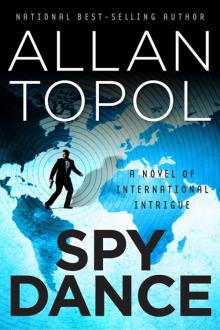 Spy Dance
Spy Dance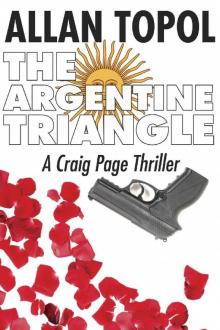 The Argentine Triangle: A Craig Page Thriller
The Argentine Triangle: A Craig Page Thriller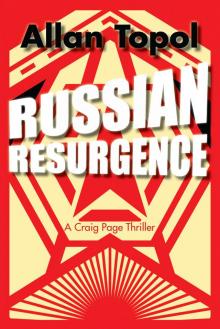 Russian Resurgence
Russian Resurgence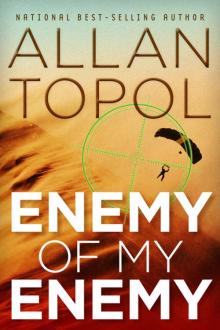 Enemy of My Enemy
Enemy of My Enemy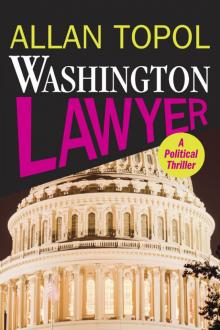 The Washington Lawyer
The Washington Lawyer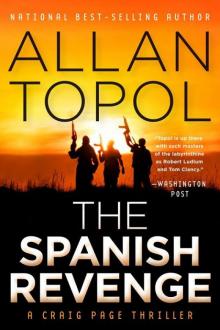 THE SPANISH REVENGE (Craig Page series)
THE SPANISH REVENGE (Craig Page series)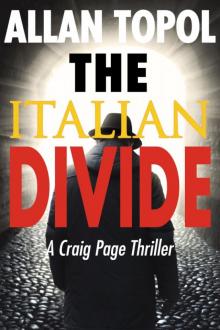 The Italian Divide
The Italian Divide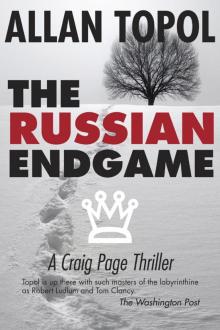 The Russian Endgame
The Russian Endgame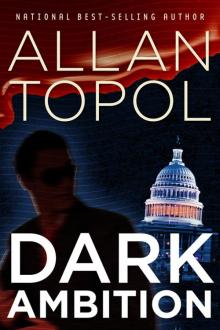 Dark Ambition
Dark Ambition